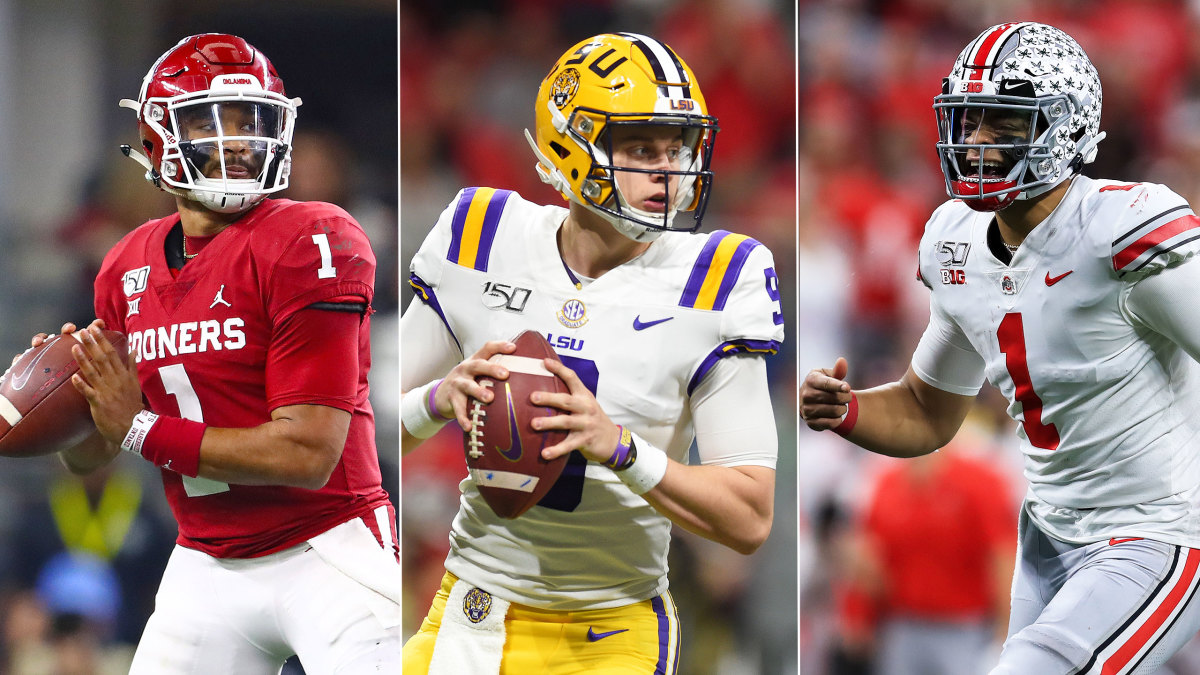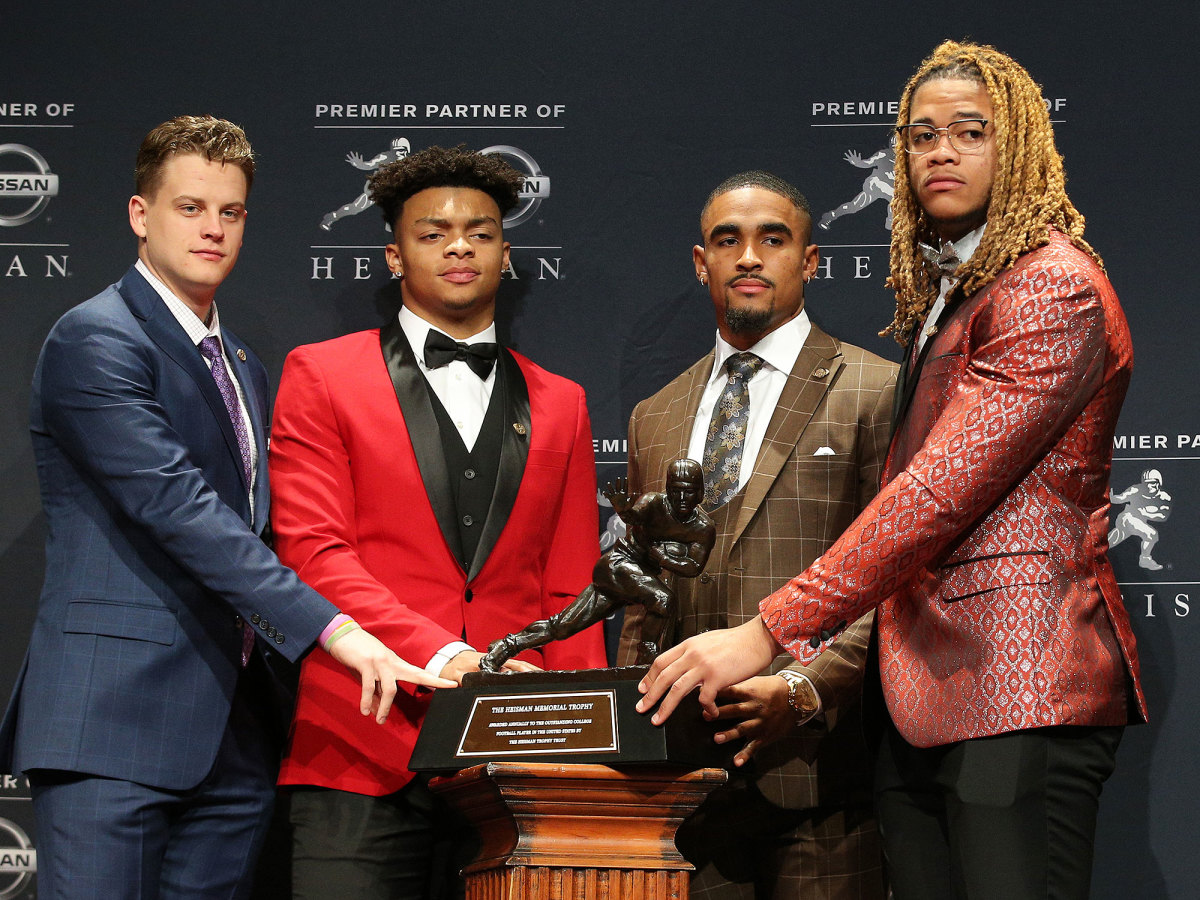Transfer QB-Heavy Playoff Field Could Be College Football's New Normal

ATLANTA, Ga. — Minutes apart, Joe Burrow and Jalen Hurts sat in the same seat here Tuesday.
How fitting. Their paths to this place, the Peach Bowl, are similar in so many ways: two transfer quarterbacks who have captained their new team to the College Football Playoff (LSU and Oklahoma) after losing a starting competition with their old team (Ohio State and Alabama), separating from their former school so amicably that those fan bases still root for them.
It’s weird, somewhat unusual, but we all better get used to it. This is the way of the future, no better indicator of that than this year’s playoff quarterbacks, three of whom are transfers. Ohio State’s Justin Fields joins Burrow and Hurts, all three of them Heisman Trophy finalists, too. You can creatively connect the dots to link them each to one another. Though it happened a year apart, Burrow’s departure from Ohio State opened a spot for Fields, who left Georgia, the same Georgia whose halftime lead over Alabama in the 2017 national championship game resulted in the benching of Hurts, who eventually left Alabama. It’s a stretch, sure, but in a way they are all somewhat interconnected.

What if Burrow had never left Ohio State? Maybe he’d be leading the Buckeyes into the playoff. Maybe Fields would have remained at Georgia, had beaten out Jake Fromm this season and be competing as a Bulldog, not Buckeye, here in Atlanta. What if Georgia didn’t force the Hurts-to-Tua Tagovailoa quarterback change in 2017? Maybe Hurts is here, too, wearing a different shade of red.
Another peculiarity: the winners of those QB battles, Tagovailoa at Alabama and Fromm at Georgia, fell short this year of reaching the CFP while the losers, of course, are here. What an odd era of college football this is. And it’s likely to get even weirder. “I don’t think it’s going to change, you know what I’m saying?” says LSU offensive coordinator Steve Ensminger, speaking to reporters in Atlanta on Christmas Eve, four days before the 1-seeded Tigers (13-0) meet the 4-seed Sooners (12-1). “It’s not going to change and that’s the good and bad of it. You’re sitting there as a coach and you have players on your team that’s going to enter the transfer portal. It affects your depth and everything else, but you also get a chance to sign some great players and they come to your school, just like Joe did. It made a difference in our team.”
The transfer wave is washing across all of college football like never before. Burrow became the third consecutive transfer to win the Heisman Trophy earlier this month. In the previous 82 years of the Heisman, there were four such winners. “If this isn’t proof that the transfer rules and transfer culture is really changing the outcomes in college football right now, nothing is,” says Chris Huston, a Heisman historian.
Of the 20 teams that qualified during the first five years of the CFP, four of them had starting quarterbacks who had transferred, just one more than this year’s field of four. “I think transfers are really good for college football,” Burrow says. “I don’t think you want to see me, Jalen or Justin on the bench somewhere.” Defensive coordinators would like a word, Joe.

All three quarterbacks got to meet and interact with one another in New York at the Heisman Trophy ceremony, where Burrow claimed the award over second-place Hurts and third-place Fields. Lump in Trevor Lawrence, quarterback for other playoff participant Clemson, and this postseason field has the four best quarterbacks in college football, Ensminger says, a sign of the importance of the position in this spread-frenzied, pass-leaning era. Their combined numbers are eye-popping, as you’d expect: 74.9 completion percentage, a 154-to-22 touchdown-to-interception mark and more than 14,400 yards passing (278 a game). And three of the four weren’t good enough to win jobs at their last stop? “To each their own,” says Hurts. “Everybody is chasing the same goal, but it may not look the same getting there, might not be the same route.
In a meeting with reporters Tuesday in downtown Atlanta, Hurts made sure the media understood that his situation isn’t like Fields or Burrow. He’s different. He uses the word “unprecedented” to describe his journey. After all, he says, what starter with a 26-2 record, an SEC championship and two national title game appearances has ever lost his job? “Nobody else has gone 26-2, won all these games and had to leave. It’s all different situations,” he says. “I left because I was used to playing and I wasn’t playing. Other guys have left because they haven’t played yet.”
In the end, though, they’re all identified as the same: transfer quarterbacks now in the playoff. We all better get used to it.
